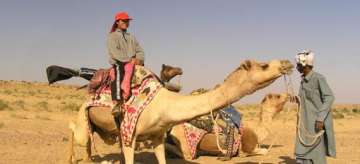Jaipur: Respecting the Rajasthan government's decision to adopt Camel as the state animal, Anjuman Society of Khandan-e-Amiriya (ASKeA) in Tonk district has decided to stop its 150-year-old tradition of sacrificing camel on the day of Eid-Ul-Zuha slated for tomorrow.
“There would be no more camel sacrifice on Eid-Ul-Zuha falling tomorrow, and the 150-year-old tradition of Khandan-E-Amiriya of Tonk ends now to save the animal and to maintain peace and communal harmony in the Tonk district,” Nawab Hamid Ali Khan, a senior member of royal family and General Secretary of ASKeA told PTI over phone.
“There was no political or social pressure on Nawab family, it was our independent decision in the wake of Rajasthan government giving the status of state animal to Camel,” Hamid justified.
In recent years there were different voices by some activists against Nawab family's animal sacrifice, but ASKeA was comprised of over 7000 to 8000 families who followed this tradition in the royal family fort every year on Eid-Ul-Zuha, Hamid said.
In tomorrow's celebration ASKeA families would gather in Nawab haveli and would go for he-goat sacrifice to observe Eid-ul-Zuha, he said.
A couple of days ago at a peace committee meeting organised by the Tonk district authorities, the Nawab family had hinted to stop the camel sacrifice, quoting the meeting state president of People for Animal, an NGO run by Maneka Gandhi, Babulal Jaju told PTI.
“We welcome Nawab family's decision that it took after years of protest and demand of People's for Animal not to sacrifice mute animal which is very useful in farming and other purposes including its wool,” Jaju said.
After PFA's protest the Nawab family had stopped camel sacrifice which they used in public exhibit in open, Jaju said, adding it was later restricted to the Nawab haveli area only for family members.
The tradition of sacrificing camel had begun in 1864 by the then ruler of Tonk Nawab Ibrahim Ali Khan IV.
During that period the entire state was governed under Shariat Law (Islamic law). This practice had begun keeping in mind the poor people of Tonk who could not enjoy and afford to have sacrificial meat on Eid-ul-Zuha, he said.
In earlier history of Nawab, two camels were sacrificed which was later reduced to one in 90s.
Latest India News
